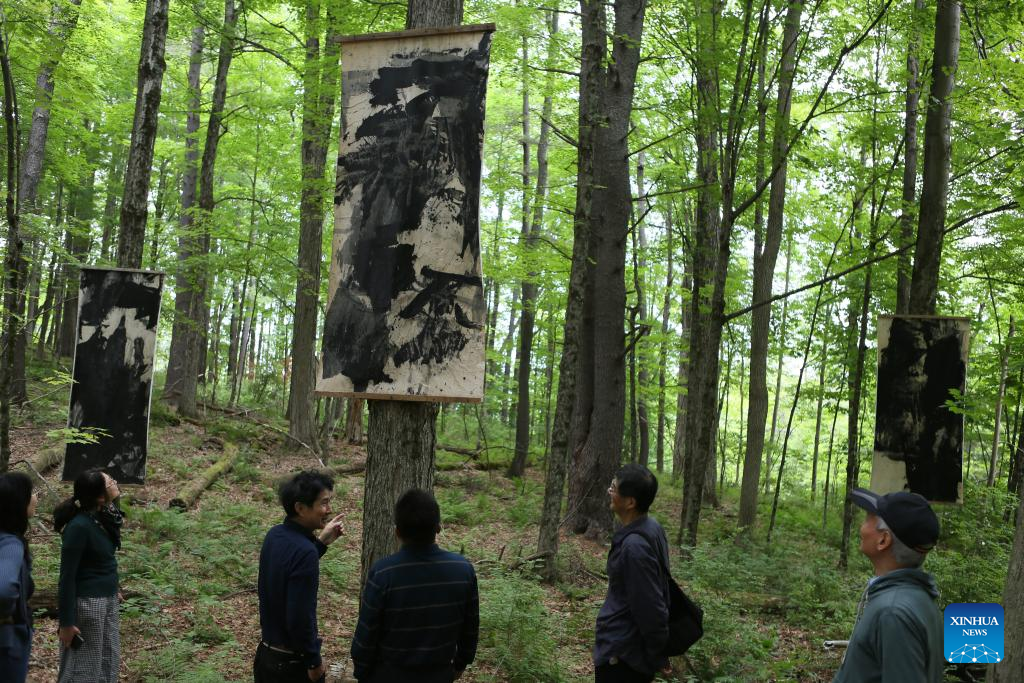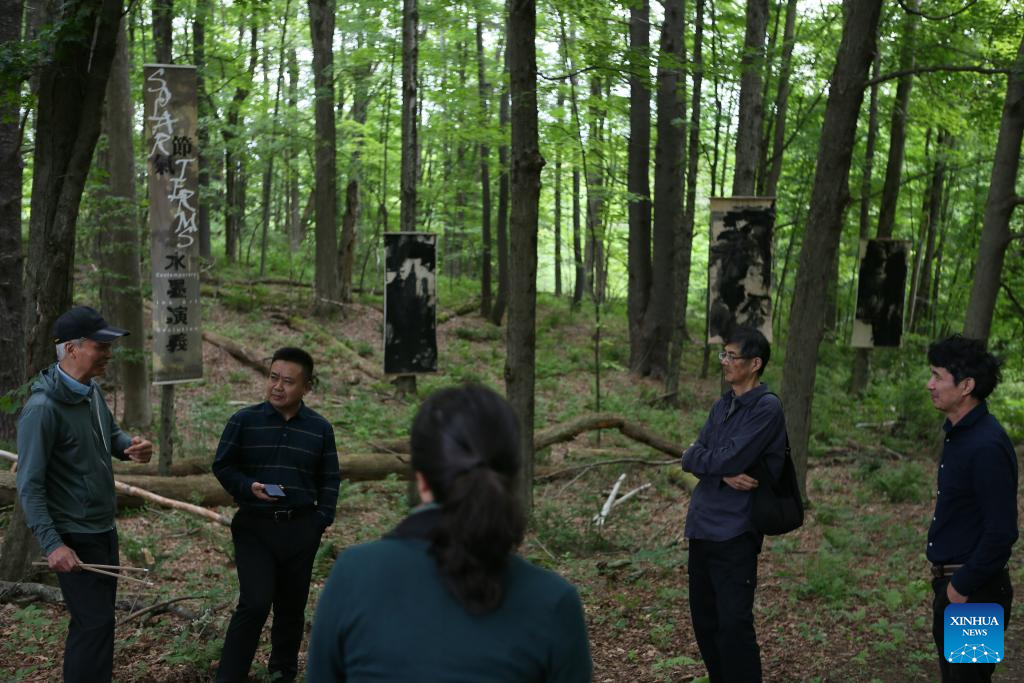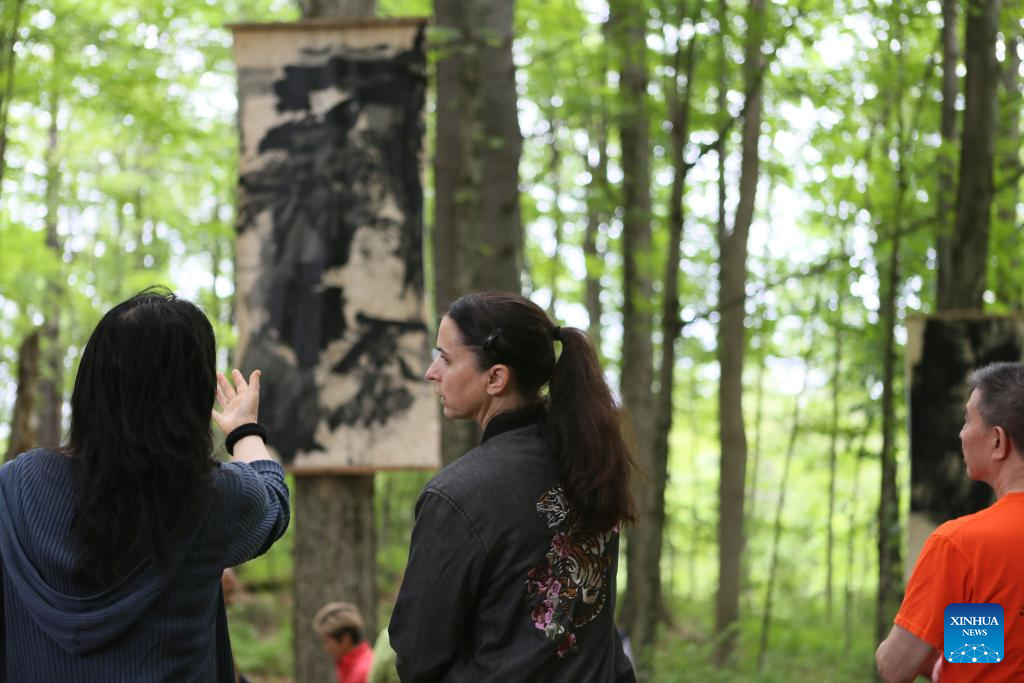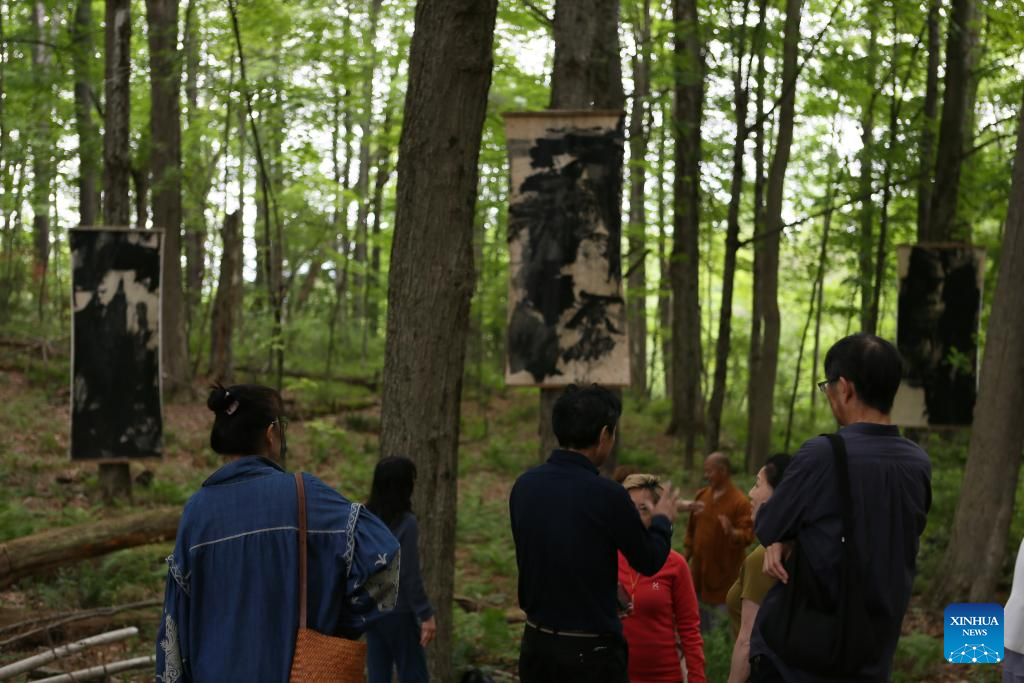Feature: Chinese artists test nature's hand in U.S. Massachusetts forest
Source: Xinhua
Editor: huaxia
2025-07-01 06:40:45

Chinese painter Lan Zhenghui (3rd L) introduces his work during an outdoor exhibition "Solar Terms: Contemporary Ink Art Event" in Lenox, Massachusetts, the United States, on June 28, 2025. In a wooded corner of Eastover Estate & Eco-Village, a dozen tall scrolls, roughly a meter wide and three meters high, sway quietly in summer breeze, having been visibly transformed by rain, snow, sunlight and time since they were installed one year ago. The scrolls were painted on rice paper, affixed to durable non-woven fabric, and then framed and suspended between trees in the forest of the U.S. state of Massachusetts. (Xinhua/Zhang Fengguo)
by Xinhua writer Yang Shilong
LENOX, Massachusetts, United States, June 30 (Xinhua) -- In a wooded corner of Eastover Estate & Eco-Village, a dozen tall scrolls, roughly a meter wide and three meters high, sway quietly in summer breeze, having been visibly transformed by rain, snow, sunlight and time since they were installed one year ago.
The scrolls were painted on rice paper, affixed to durable non-woven fabric, and then framed and suspended between trees in the forest of the U.S. state of Massachusetts.
LET NATURE FINISH THE PAINTINGS
This is the closing chapter of "Solar Terms: Contemporary Ink Art Event," an outdoor exhibition that opened on July 27, 2024, and will end on July 26, 2025. It features works by four leading Chinese contemporary ink painters -- Lan Zhenghui, Li Gang, Qin Feng and Zhang Zhaohui -- each of whom explores abstraction and expressive brushwork while remaining grounded in the literati tradition.
The project was never about preservation. The works were made to weather. "In traditional Asian art," said art critic Richard Vine, also former managing editor with Art in America, at the opening ceremony. "We often depict fragility -- cherry blossoms, wilting flowers -- to suggest something lasting, transcendent. Here, it's reversed. The art itself is fleeting. It's being altered, or destroyed, by nature. And that's the point."
Some scrolls have faded. Others bear the marks of rain or tearing wind. A few have disappeared entirely. But for returning visitors, these changes only deepen the meaning.
"It reminded me of a famous oil painting by a Chinese artist, titled My Father -- an aged man whose face is etched with deep, unmistakable wrinkles," said Lan Zhenghui. "These weathered scrolls feel the same, like a once-handsome young man who has grown old, marked by time."
Artist and local curator Shany Porras, who revisited the site on June 28, reflected on the shift. "It's no longer just about viewing the art -- it's about sensing its relationship with the world around it," she said.
"The first time I saw it, I was struck by the beauty of how the art of humans and the art of nature live together," Porras said. "These pieces get to experience what the trees experience. There's a quiet symbiosis. It made me feel small, but in a beautiful way."
DIALOGUE BETWEEN BRUSH, SEASONS, CIVILIZATIONS
Though grounded in traditional materials and techniques, the exhibition reflects a contemporary ink movement that is boldly experimental. Lan Zhenghui, known for his visceral, large-scale works, spoke of continuity through reinvention: "You must learn from the ancestors, but then you must ignite something new."
The curators, Zhang Pingjie and Xu Yufu, envisioned Solar Terms not as a static display, but as a process of collaboration between artist and environment, East and West, ink and weather.
"We're not discarding tradition," Zhang said. "We're extending it -- fusing brush and abstraction, philosophy and ecology."
"Only after living long enough abroad," Xu added, "can one truly confront the depth of one's native culture -- and feel the urge to respond. That's where dialogue begins."
The choice of site was deliberate. Eastover, a historic Gilded Age estate turned eco-retreat, spans 600 acres of unpolluted forest and natural spring water. The conditions allowed the scrolls -- made with organic ink and paper -- to interact freely with the elements. Nothing was artificially preserved. "We wanted nature itself to help complete the work," Zhang noted.
Framed around the 24 solar terms of the traditional Chinese calendar, the exhibition was designed to evolve with the seasons. And it did. In the fall of 2024, two visiting Taoist priests from the Tianlong Sect praised the project as a living embodiment of "Dao Fa Zi Ran" -- Tao follows Nature.
Now, as the final days approach, what remains is not just altered artwork, but a visual record of time, transformation and philosophical intent. "Even a fragment is a completed work," Zhang said. "Because the process is the art."
As Vine put it at the outset: "This installation reminds us that nature always wins -- either through harmony or consequence. The art doesn't resist that truth. It reveals it." ■

Curators Zhang Pingjie (2nd R) and Xu Yufu (1st L), and Chinese contemporary ink painter Lan Zhenghui (1st R) join a discussion with visitors during an outdoor exhibition "Solar Terms: Contemporary Ink Art Event" in Lenox, Massachusetts, the United States, on June 28, 2025. In a wooded corner of Eastover Estate & Eco-Village, a dozen tall scrolls, roughly a meter wide and three meters high, sway quietly in summer breeze, having been visibly transformed by rain, snow, sunlight and time since they were installed one year ago. The scrolls were painted on rice paper, affixed to durable non-woven fabric, and then framed and suspended between trees in the forest of the U.S. state of Massachusetts. (Xinhua/Zhang Fengguo)

Visitors talk in front of a work during an outdoor exhibition "Solar Terms: Contemporary Ink Art Event" in Lenox, Massachusetts, the United States, on June 28, 2025. In a wooded corner of Eastover Estate & Eco-Village, a dozen tall scrolls, roughly a meter wide and three meters high, sway quietly in summer breeze, having been visibly transformed by rain, snow, sunlight and time since they were installed one year ago. The scrolls were painted on rice paper, affixed to durable non-woven fabric, and then framed and suspended between trees in the forest of the U.S. state of Massachusetts. (Xinhua/Zhang Fengguo)

People visit an outdoor exhibition "Solar Terms: Contemporary Ink Art Event" in Lenox, Massachusetts, the United States, on June 28, 2025. In a wooded corner of Eastover Estate & Eco-Village, a dozen tall scrolls, roughly a meter wide and three meters high, sway quietly in summer breeze, having been visibly transformed by rain, snow, sunlight and time since they were installed one year ago. The scrolls were painted on rice paper, affixed to durable non-woven fabric, and then framed and suspended between trees in the forest of the U.S. state of Massachusetts. (Xinhua/Zhang Fengguo)



